
The University of California, Berkeley is a public land-grant research university in Berkeley, California, United States. Founded in 1868 and named after Anglo-Irish philosopher George Berkeley, it is the state's first land-grant university and the founding campus of the University of California system. Berkeley is also a founding member of the Association of American Universities. It has been regarded as one of the top universities in the world.
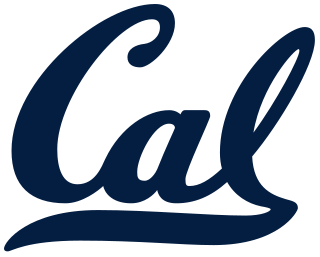
Big Game is the name given to the California–Stanford football rivalry. It’s an American college football rivalry game played by the California Golden Bears football team of the University of California, Berkeley and the Stanford Cardinal football team of Stanford University. Both institutions are located in the San Francisco Bay Area. First played in 1892, it remains one of the oldest college rivalries in the United States. The game is usually played in late November or early December and its location alternates between the two universities every year. In even-numbered years, the game is played in Berkeley while odd-numbered years are played at Stanford.
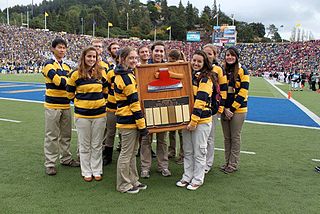
The Stanford Axe is a trophy awarded to the winner of the annual Big Game, a college football match-up between the University of California, Berkeley Golden Bears and the Stanford Cardinal. The trophy consists of an axe-head mounted on a large wooden plaque, along with the scores of past Big Games. Cal currently holds the Axe after defeating Stanford 27–15 in the 2023 game.

Oski the Bear (Oski) is the official mascot of the University of California, Berkeley ("Cal"), representing the California Golden Bears. Named after the Oski Yell, he made his debut at a freshman rally in the Greek Theatre on September 25, 1941. Prior to his debut, live bears were used as Cal mascots.
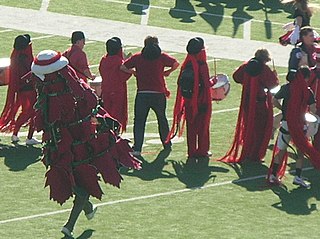
The Stanford Tree is the Stanford Band's mascot and the unofficial mascot of Stanford University. Stanford's team name is "Cardinal", referring to the vivid red color, and the university does not have an official mascot. The Tree, in various versions, has been called one of America's most bizarre and controversial college mascots. The tree regularly appears at the top of Internet "worst mascot" lists but has also appeared on at least one list of top mascots.

The Solid Gold Sound of the UCLA Bruin Marching Band represents the university at major athletic and extracurricular events. During the fall marching season, this 250-member band performs at the Rose Bowl for UCLA Bruin home football games. Pregame shows by the band aim to build crowd energy and enthusiasm with traditional UCLA songs like "Strike Up the Band for UCLA", "Bruin Warriors", and "The Mighty Bruins". Throughout the game, the band performs custom-arranged rock and pop songs, as well as the traditional fight songs and cheers of the university. The UCLA Varsity Band appears at basketball games and other athletic contests in Pauley Pavilion. In 2018, the Bruin Marching Band was featured on the Muse album "Simulation Theory" performing the Super Deluxe version of the song "Pressure."

The Associated Students of the University of California (ASUC) is the autonomous and officially recognized students' association of the University of California, Berkeley. It is the only students' association within the University of California that is fully autonomous from the university administration. Founded in 1887, the ASUC is an independent, 501(c)(3) non-profit, and unincorporated association. The ASUC controls funding for all ASUC-sponsored organizations, advocates on behalf of students to solve issues on campus and in the community, engages with administrators to develop programming, increase student-organizational resources, and increase transparency.

The UC Davis Marching Band is the official marching band of the University of California, Davis, organized in fall of 2019. It is the successor to the student-run California Aggie Marching Band-uh!, which existed from the 1920s to 2019. In 2018, the Band-uh had roughly 250 members. It performed at home and away games to cheer on the UC Davis Aggies sports teams, marched in parades, and played at events on the UC Davis campus as well as in the surrounding Davis community.
Bruin Warriors, also known as "Sons of Westwood" and "Big C", is a fight song of the University of California, Los Angeles (UCLA). The tune comes from Big C, a school fight song for the University of California, Berkeley. The UCLA Bruin Marching Band plays the song as part of their football pregame show as they move into the script UCLA formation. The song has been updated since 2016 with the new title "Bruin Warriors", and lyrics that include "daughters" as well as "sons".
The Cal Poly Mustang Band, also known as The Pride of the Pacific, is the official marching band of California Polytechnic State University in the city of San Luis Obispo, California. Although the band is not a competitive marching band they serve as a school spirit organization. The band functions in two different forms throughout the year. In the fall the band marches as The Mustang Marching Band and during Cal Poly's winter quarter they function as a pep band. The band attends many athletic events during the year to encourage the school's athletic teams and audience support/involvement. The marching band is well-known around campus as an exciting and spirited group that brings pep, passion, and tradition to every performance. The marching band is conducted by three directors: Christopher J. Woodruff, Nicholas P. Waldron, and Len Kawamoto.
"Big C" is a fight song of the University of California, Berkeley. It was composed in 1913 by Harold P. Williams, with lyrics by Norman Loyall McLaren. It was written to commemorate the construction of the large concrete "C" in 1905 on the "rugged Eastern foothills" of the Berkeley campus. The song was the winning entry in the Daily Californian school song competition in 1913. Arrangements of the tune are used by other schools in the University of California system.

The Phoenix Five were a group of five University of California, Berkeley (Cal) students in Theta Chi who stole the Stanford Tree from the Band Shak on the campus of Stanford University in the early morning hours of October 17, 1998. The Phoenix Five held the 10-foot-tall (3.0 m) costume and university's unofficial mascot "hostage" for two weeks, and the reaction to the heist by school administrators fueled a frenzy of media coverage which resulted in the prank being regarded as one of the most famous and notable in the history of the Big Game rivalry between Cal and Stanford. The Phoenix Five used pseudonyms to hide their true identities, going by Mr. Black, Mr. Green, Mr. Orange, Mr. White, and Mr. Yellow.

CalTV is a student run online television station at University of California, Berkeley. Since its founding, CalTV has grown into one of the largest student run media organizations on the west coast. CalTV is a chartered organization of the Associated Students of the University of California (ASUC).
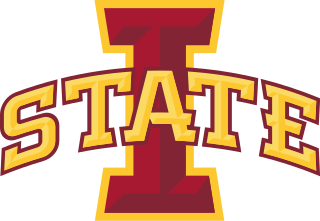
The Iowa State University Cyclone Football 'Varsity' Marching Band (ISUCF'V'MB) is the marching band of Iowa State University. Also known as the Cyclone Marching Band (CMB), it is nicknamed the "Pride of Iowa State", the "Best of the Midwest", and the "Varsity Band". The band performs in support of the Iowa State Cyclones football team at all home games and at some away games versus Big 12 Conference rivals. The band plays at high school band festivals, indoor concerts, and post-season bowl games.

The UC Men's Octet, sometimes termed the Cal Men’s Octet or the UC Berkeley Men’s Octet, is an eight-member male a cappella group at the University of California, Berkeley. Founded in 1948 as a member of the UC Choral Ensembles, the group's broad repertoire features several genres of music including barbershop, doo-wop, pop and alternative, and a healthy dose of Berkeley fight songs. The Octet has recorded over a dozen albums and is one of only three multiple-time champions of the International Championship of Collegiate A Cappella (ICCA)—the other two being USC's SoCal VoCals and Berklee's Pitch Slapped—having won the competition in both 1998 and 2000.
Robert Orlando Briggs was the longtime director of the University of California Marching Band. He was the fourth full-time director since the founding of the band in 1891.

The University of California Jazz Ensembles, also known as the UC Jazz Ensembles, UC Jazz, or UCJE, is the student jazz organization founded in 1967 on the University of California, Berkeley, campus. Founded in 1967, it comprises one or more big bands, numerous jazz combos, a vocal jazz ensemble, an alumni big band, and instructional classes. With a mission statement to foster a community for the performance, study, and promotion of jazz at U.C. Berkeley, its Wednesday Night big band provides free concerts every Thursday noon on Lower Sproul Plaza, its various units perform throughout the San Francisco Bay Area including area high schools, travel to collegiate jazz festivals, and perform overseas, and for many years it sponsored the annual Pacific Coast Jazz Festival. It also provides master classes by its instructors and clinics by prominent guest artists. It has nurtured numerous musicians who have become professional jazz musicians and educators. UC Jazz Ensembles is one of three groups, with the Cal (marching) Band and UC Choral Ensembles, forming Student Musical Activities (SMA), a department within Cal Performances on the U.C. Berkeley campus. Its members are primarily U.C. Berkeley undergraduate and graduate students, representing many academic disciplines.

David W. Tucker (1929–2003) was an American jazz trombonist, music educator, composer of band and orchestral music, record producer, and marching band arranger, most renowned as the director of the University of California Jazz Ensembles from 1969 until 1985. Under his direction, the organization expanded to become the largest musical organization on the campus of the University of California, Berkeley, had an international reputation resulting from foreign tours, and sponsored the Pacific Coast Collegiate Jazz Festival. Numerous student members of the organization have become renowned jazz musicians, composers, and music educators.
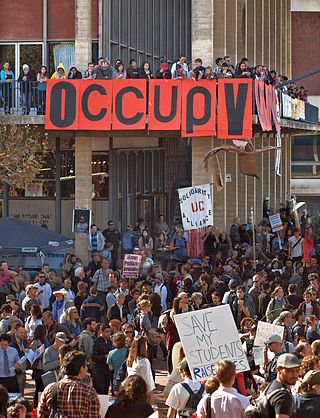
Occupy Cal included a series of demonstrations that began on November 9, 2011, on the University of California, Berkeley campus in Berkeley, California. It was allied with the Occupy Wall Street movement in New York City, San Francisco Bay Area Occupy groups such as Occupy Oakland, Occupy Berkeley, and Occupy San Francisco, and other public California universities. "Cal" in the name "Occupy Cal" is the nickname of the Berkeley campus and generally refers specifically to UC Berkeley.
Blockeley is a Minecraft server created by students of the University of California, Berkeley, which is a 1:1 scale reconstruction of the university campus.
 The Cal Band during the 2004 marching season.
The Cal Band during the 2004 marching season.














